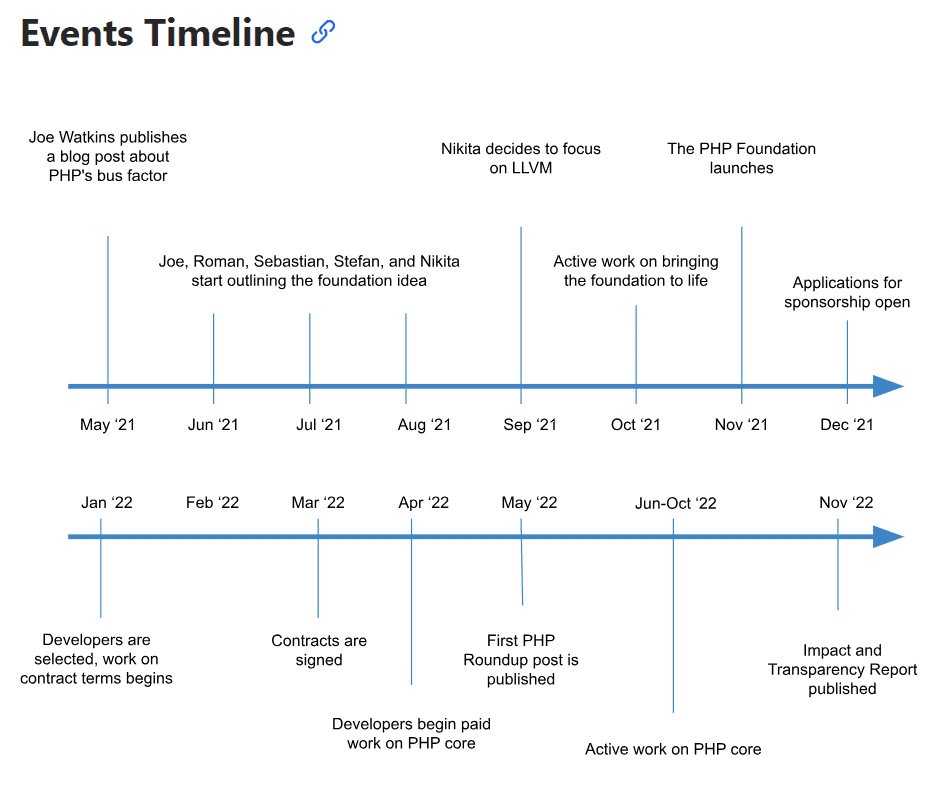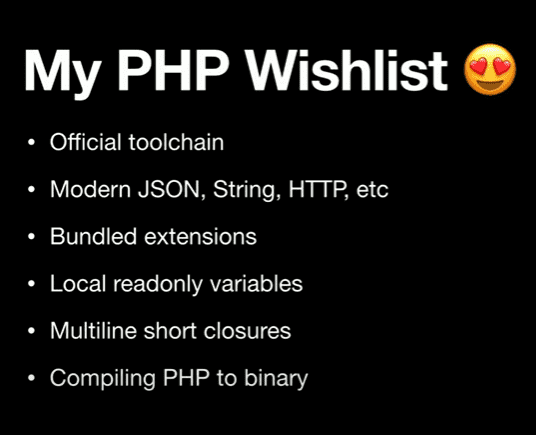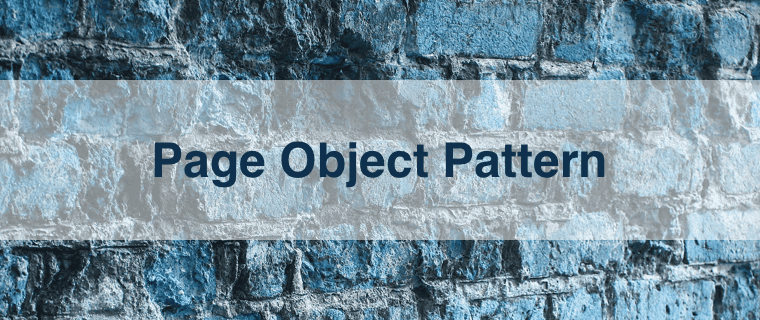The PHP Foundation - the future of PHP is in good hands!
PHP began as a personal project by Rasmus Lerdorf in 1994, initially named Personal Home Page, and has gained popularity since then thanks to its simplicity and availability in most web hosting environments. PHP was originally designed as a set of Common Gateway Interface (CGI) binaries written in C, but over the last two decades, it has evolved into a powerful server-side scripting language.
As PHP has grown, so has its need for support and development. Today, this is provided by the PHP Foundation and the PHP development team itself. The foundation plays a key role in PHP’s development, security updates, and engaging with the community. It is a non-profit organization supported purely by sponsors. If you want to be one of them, check out the PHP Foundation Sponsor page, there you'll find all the ways to support the Foundation.
Origins of the PHP Foundation
Although PHP was surprisingly popular early on, it was still primarily developed and maintained by Rasmus himself. The other developers and the wider community recognised that this was a significant problem given the importance of PHP as a language and the large number of projects that used it.
Since then, PHP has been actively developed by a huge number of people, but in November 2021, one of the significant contributors, Nikita Popov, decided to leave the project to pursue his passion outside of PHP. This prompted JetBrains, the makers of PhpStorm IDE, along with nine other companies, to form the PHP Foundation.
Roman Pronskiy, a core PHP Foundation team member, recently gave a talk where he outlined its origins and the reasons for its creation in more detail.
A timeline of events that led to the formation of the PHP Foundation.
The foundation’s recent impact and transparency report clearly summarizes why it’s needed:
“The PHP language is a living entity and, as such, requires continuous support to address developer issues, resolve security vulnerabilities, and has to evolve to meet the needs of the future.”
The PHP Foundation’s Mission and Goals
The foundation operates through Open Collective, a service provider that handles the financial and legal aspects of grassroots groups.
Mission
Initially, the PHP Foundation's mission was to ensure the long life and prosperity of the PHP language. However, the mission statement was updated in 2024 as follows:
“The PHP Foundation’s mission is to ensure the long-term prosperity of the PHP language. The PHP Foundation focuses on providing financial support and guidance to PHP language developers to support its goals of improving the language for its users, providing high-quality maintenance, and enhancing the PHP language project to retain current contributors and integrate new ones. The PHP Foundation aims to promote the public image of the PHP language to retain existing and attract new users and contributors.”
The updated mission statement establishes four priorities for the foundation:
- Improve the language for end users.
- Provide high-quality maintenance.
- Enhance the project to retain current contributors and onboard new ones.
- Promote the public image of PHP.
Goals
The PHP Foundation does not have fixed goals. The goals are dynamic in nature and aim to achieve the mission of the organization. The goals are set every year to progress the foundation's mission, the availability of funding and specific agreements with donors, etc.
The list below outlines the foundation’s goals for 2024.
-
Organizational
- Onboard new major sponsors
- Explore strategic partnerships and marketing opportunities
- Further develop the Advisory Board initiative
- Grow the foundation's community
-
Technological
- Ongoing maintenance and development of the PHP core
- Deliver the STF projects
- Improve the quality of the ideas and RFCs coming from the foundation
- Conduct research and surveys to define priorities
- Develop a high-level roadmap for PHP changes sponsored by the foundation
For more details on the goals for 2023 and their achievement status, you can refer to the foundation transparency and impact report.
However, the foundation does not wish to influence the Request For Comment (RFC) process, which will continue to be decided by the PHP community. For those unfamiliar, the PHP community finalizes the features for each version through a community voting process. Each feature proposal is submitted to the community as an RFC.
The Foundation Model
As it becomes easier for a foundation to raise money, influence language development, and support community initiatives, the use of foundation structure to support a language's evolution is gaining popularity.
Other foundations that help support a language include the .NET Foundation, Kotlin Foundation, OpenJS Foundation, and Rust Foundation.
In contrast, the PHP Foundation does not support individual projects directly; instead, individual projects like Laravel, Symfony, and WordPress sponsor the foundation. Staying true to its mission, the foundation focuses on developing and sustaining the PHP language itself.
Initiatives and Projects
The PHP Foundation has collaborated with the Sovereign Tech Fund (STF) to improve the PHP ecosystem through the following projects:
- PECL Overhaul: Currently, PHP extensions like Xdebug, Redis, etc., live outside of the PHP core and are added to the language through extensions. PECL/PEAR is the current method for this but is prone to supply chain attacks. The foundation is initiating a project to replace the current tools with new tools that make it easier for developers and end users to use extensions. The draft proposal can be seen on GitHub - ThePHPF/pie-design.
- Testing Tool for FPM: FastCGI Process Manager (FPM) is a very popular way to host PHP applications. Although FPM has evolved significantly over the last decade, the testing infrastructure for FPM applications is lacking. The Foundation is aware of this and has commissioned a new project to provide detailed test logs and interface with load testing tools like wrk to simulate real-world usage and load. The current work is available at GitHub - bukka/wst and will be moved to the PHP Foundation repository once ready.
- Security Audit: The foundation has partnered with OSTIF to conduct a security audit of the PHP codebase and fix issues, making PHP a safer choice among developers. Projects like this align with the foundation’s goal of improving the public image of PHP.
- Documentation Improvements: This project aims to enhance the current English documentation for PHP by including missing functions, reviewing and removing user comments, integrating live examples, and simplifying the maintenance process for the documentation.
It is worth noting that these are not independent projects initiated by community members that the foundation is sponsoring but are new projects started by the foundation to address areas where the team believes PHP is lacking.
Governance and Leadership
A Governing Board oversees the performance and objectives of the PHP Foundation. The board includes veteran PHP community leaders, representatives of funding companies, and other key stakeholders.
The current composition of the Governing Board is as follows:
| Name | Represents |
|---|---|
| Sebastian Bergmann | Community |
| Joe Watkins | Community |
| Nils Adermann | Private Packagist |
| Benjamin Eberlei | Tideways |
| Josepha Haden | Automattic |
| Roman Pronskiy | JetBrains |
| Nicolas Grekas | Symfony |
| Sara Golemon | Community |
| Nikita Popov | Community |
| Matthew Weier O'Phinney | Perforce |
In addition to the Governing Board, the PHP Foundation also has an advisory board which keeps major sponsors abreast of the latest developments in the foundation and allows them to see the direct impact of their support. The Advisory Board includes members from Moodle, Shopware, Laravel and more.
Impact on PHP Language
The developers sponsored by the foundation make contributions to the language under four categories:
- Commits to PHP
- Pull Request Reviews
- RFC Submissions
- Release Maintenance
The largest part of their work is maintenance, which includes creating and updating documentation, performance improvements, and security.
The foundation also analyzes PHP’s competitors to think about new ways in which the language can be improved, these include the backwards compatibility of Go and the stability index of Node.js.
Roman Pronskiy’s future PHP wishlist.
At the moment, developers at the foundation are working on many improvements, including:
- New core autoloading mechanism with support for functional loading.
- Property hooks and pattern matching
- Tools for installing extensions
Community Engagement
The PHP Foundation has a significant community presence on its Governing Board, accounting for 4 out of 10 board seats. This ensures that the community's voice is always heard and that major decisions are made with community input. As mentioned earlier, the PHP Foundation is currently focusing solely on the language, and therefore, the foundation itself is not organizing any community events or conferences.
Foundation members do actively participate in conferences and events however, to stay updated on the community needs and priorities. In 2023, foundation representatives attended nine conferences.
The foundation is also building its social media presence to reach out to PHP developers and hear their voices. They have a presence on X, LinkedIn, and Mastodon. It also makes it easy for people to sponsor or become a member of the foundation. The foundation is also active in its discussions section on Github and welcomes feedback from developers.
Challenges Ahead
The major challenge the foundation is facing is to ensure sustainable sponsorship. Many contributions are currently just one-off. However, recurring contributions make planning for the future easier and improve the stability of the foundation. In 2021 there were only two paid contributors to PHP! As of 2024, there are 10 core developers paid a total of $627,000 by the PHP foundation. But if they want to add more members and speed up the development of PHP they’ll need more funding.
Another major challenge for the foundation is the decline in PHP’s popularity and usage. This decline is mainly driven by WordPress's reduced usage of PHP and the shift of web development to JavaScript. The widely-followed TIOBE Index showed an all-time low usage of PHP in April 2024. Several other sources also show a similar trend in the decline of PHP usage despite it still powering 75.9% of the web in 2024. If the foundation is to be successful in its goal of boosting the popularity of PHP, this decline will have to be reversed.
Conclusion
The evolution and existence of PHP are crucial not just for the Internet but also for the security of the websites and the businesses that rely on it to power them. The creation of the PHP Foundation was, hopefully, a major step in removing the dependency on individuals and ensuring continued development and improvement of the language.
Despite facing challenges such as funding sustainability and the declining use of PHP, the foundation will hopefully provide a solid framework for the growth of the language. As PHP and the web itself continue to evolve, the foundation will be crucial in shaping PHP’s future trajectory and ensuring its continued presence in the web development landscape.





